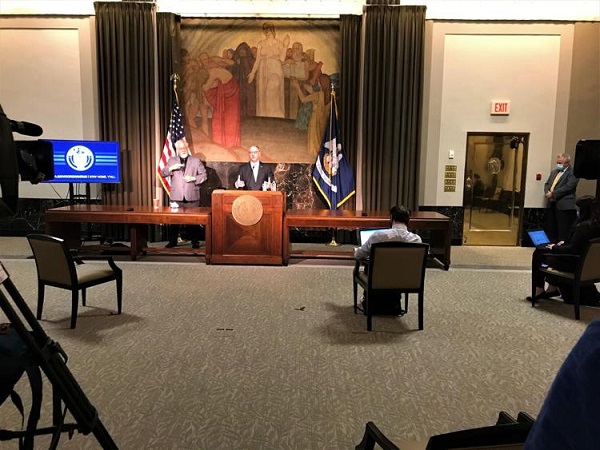
11.22.20 – The Advocate
Gov. John Bel Edwards liberally used his veto pen for the majority-Republican Legislature’s latest special session, striking down 15% of the measures that reached his desk in another indication of sharp disagreements over how to respond to the coronavirus pandemic.
The Democratic governor rejected 11 of the 71 bills passed by lawmakers in October and stripped out a handful of projects added to the state budget with a series of line-item vetoes.
Jettisoned proposals would have given lawmakers more power over the governor’s emergency decision-making, offered businesses more tax breaks and fee exemptions amid the virus outbreak and changed some election laws. A few bill rejections were for technical problems.
In a special session criticized for doing too little or not being needed at all, Edwards’ vetoes further whittled down the list of accomplishments.
The vetoes were not a surprise since Republican legislative leaders called the session against Edwards’ wishes and without the governor’s input in the agenda. And while GOP lawmakers are asserting more independence for their separate branch of government, they don’t have the numbers to override a gubernatorial veto in the House, putting limits on their power.
Republican lawmakers said they called the special session — with a price tag estimated at $1 million — to respond to the coronavirus pandemic and address Hurricane Laura and Delta recovery needs. For many Republicans, particularly in the House, they wanted to curb the governor’s emergency powers and remove some or all of Edwards’ virus restrictions.
Edwards vetoed bills to give lawmakers more authority in his emergency decisions.
He struck down a proposal by Covington Rep. Mark Wright that would have let lawmakers nullify individual pieces of a governor’s emergency order by a majority vote for any emergency declaration extended beyond 30 days. The governor also refused a measure by Slidell Sen. Sharon Hewitt that would have allowed lawmakers to override a governor’s blocking of an emergency elections plan with a two-thirds vote.
Edwards said Wright’s bill “does not represent a serious approach to responding to a public health emergency.” Wright replied that the measure represented “reasonable checks on executive power.”
GOP lawmakers expected Edwards’ veto of Wright’s legislation. As a backstop, 65 Republicans in the House on the final day of the special session invoked a state law that allows a majority of legislators in either the House or Senate to sign a petition to revoke a governor’s emergency declaration — and all the restrictions tied to it.
Edwards challenged the legality of the petition striking at his coronavirus rules in court. A state district judge sided with the governor and declared the petition law unconstitutional. Republican Attorney General Jeff Landry, representing the House GOP, intends to appeal the ruling. Edwards’ virus rules remain in place.
On Hewitt’s bill, Edwards did not object to letting lawmakers override his decisions on emergency elections plans, but he said the voting structure ran afoul of public meeting provisions. He pledged to work with Hewitt on another version of the bill.
The governor also rejected bills that would have:
• Prohibited use of private grant dollars for election-related expenses. Lawmakers passed the measure by House GOP leader Blake Miguez on a largely party-line vote after Landry sought to block millions of dollars in grants offered to Louisiana’s local elections officials through a nonprofit backed by Facebook founder Mark Zuckerberg.
• Created a severance tax break for the oil industry for drilling new wells, estimated to cost the state $38 million over five years. Eunice Republican Rep. Phillip DeVillier objected to the nonpartisan financial analysis, arguing his proposal would create jobs and new tax collections. Edwards said “no legitimate evidence or testimony supports this assertion.” The Louisiana Oil and Gas Association said it will continue discussions with the governor about the idea.
• Prohibited anyone from intentionally voting or trying to vote absentee by mail if they are not qualified under Louisiana law. Edwards said “even a cursory review” shows existing state law already makes this an election offense and the bill was not needed. Turkey Creek Republican Sen. Heather Cloud said her “election integrity” proposal sought to clarify the law to ensure it covers absentee ballots. She said she will push the bill again.
Edwards also removed five legislative earmarks totaling $718,000 from a budget bill with his line-item veto authority. But he left intact most of the $20 million-plus in pet projects that lawmakers inserted into the budget.
Melinda Deslatte has covered Louisiana politics for The Associated Press since 2000.
